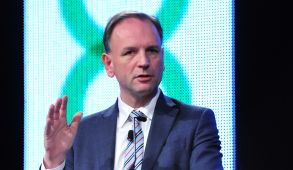Long-term plan sets out care and finance road map
Launching the plan today, Mr Stevens (pictured) said the NHS would invest in a range of measures, including: cutting edge technologies to diagnose and treat the major killer conditions; better mental healthcare with spending rising to at least £2.3bn a year by 2023/24; improved neonatal care and stroke therapy; and a greater emphasis on keeping older patients out of hospital with more care in the community.
On finance, the plan said the NHS as a whole will continue to balance its financial position across commissioners and providers each year, with the provider sector returning to financial balance in 2020/21. The service will achieve ‘cash-releasing productivity growth’ of 1.1% a year. The plan foresees a phased approach to the return to financial balance with a new financial recovery fund to support systems and organisations to achieve sustainability. There will also be an accelerated financial turnaround process for the 30 worst performing trusts.
As previously outlined, payment systems will be reformed, with 2019/20 acting as a transitional year. There will be a move away from activity to population-based payments, though in elective care some volume-based payments will be retained for now, alongside quality incentives.
Local providers and commissioners will move to integrated care systems (ICSs) by April 2021, making joint decisions about financial planning and prioritisation. Further financial reforms to be introduced after 2019/20 will support the delivery of integrated care through ICSs. While better integration and prevention will reduce demand, the service will also tackle unwarranted variation and make better use of capital investment and existing assets to drive forward with transformation.
Other measures outlined were:
- Every hospital with a major A&E will have same day emergency care in place so patients are treated and discharged with an appropriate support package to avoid the need for an overnight stay
- A new digital ‘front door’ for the NHS, allowing access to healthcare at the touch of a button
- Genetic testing for 25% of people with dangerously high inherited cholesterol – around 30,000 people
- Mental healthcare for 345,000 children and young people through expanded community-based services
- Earlier detection and better treatment of respiratory conditions to prevent 80,000 hospital admissions. Smart inhalers will be piloted to allow patients to monitor their condition.
The plan guarantees that primary, community and mental healthcare funding will grow faster than the overall NHS budget. This would fund a ‘£4.5bn new service model’, where health bodies and local government come together to provide better, joined-up care. There will be greater emphasis on prevention.
Mr Stevens said there were three truths as the NHS celebrated its 70th anniversary last year. He acknowledged there was concern about funding, staffing, increasing inequalities and pressures from a growing and ageing population. However, secondly, he said there was legitimate cause for optimism – about the potential for continuing advances in medicine and outcomes for patients – and, thirdly, pride in the service.
‘In looking ahead to the health service’s 80th birthday, this NHS long-term plan acts on all three of these realities. It keeps all that’s good about our health service and its place in our national life. It tackles head-on the pressures our staff face. And it sets a practical, costed, phased route map for the NHS’s priorities for care quality and outcomes improvement for the decade ahead,’ he added.
NHS Improvement chief executive Ian Dalton said the NHS was built on the dedication of its staff and admired around the world. ‘We need to build on these achievements and make the best use of the new investment to fundamentally reset how the NHS is run so that our growing and ageing population can get the right care at the right time and in the right place.’
Chris Hopson, chief executive of NHS Providers, warned that the extra funding agreed over the next five years – which will see spending rise by £20.5bn in real terms by 2023/24 – would cover little more than rising costs and demand.
He added: ‘The NHS frontline wants an ambitious plan but, above all, a realistic and deliverable plan. A plan that ruthlessly prioritises what the NHS will deliver, clearly setting out how those priorities match the money and staff available. A plan that’s crystal clear on how the NHS will recover the ground we’ve lost on finance and performance, that solves current workforce shortages and is realistic about how any new commitments are going to be paid for and staffed.
‘We must avoid an undeliverable wish list that makes too many promises as over promising sets the NHS up to fail.’
Don't miss our summary of the NHS long term plan.
Related content
We are excited to bring you a fun packed Eastern Branch Conference in 2025 over three days.
This event is for those that will benefit from an overview of costing in the NHS or those new to costing and will cover why we cost and the processes.